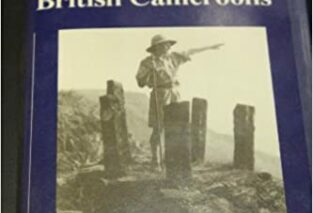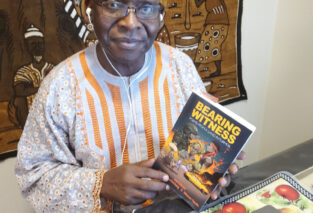
Daniel Noni Lantum, Dr. Bernard Nsokika Fonlon: An Intellectual in Politics (Gown and Throne), Yaounde SOPECAM, 1992, 80pp. No price indicated.
Some years ago, in the columns of what was then our national bi-weekly, Cameroon Tribune, No. 907, Friday, April 24, 1989, I had the honour to review a book entitled Bernard Nsokika Fonlon (1924-1986) is now a Legend: Funeral Addresses, Tributes and Eulogies, edited by a man who describes himself as Dr Fonlon’s “friend and brother”, Professor/Doctor/Faay-wo-Bastos Daniel Noni Lantum.
I remember expressing regret that three years after Dr. Fonlon’s death, what some of us had expected to become an “avalanche of publications” on the late venerable professor’s life, was still a mere trickle.
Even though that “avalanche of publications” has been long in coming, one is comforted by the quality of the increasing bibliography on him; my favourite being that beautiful book entitled, Socrates in Cameroon, one of the editors being Dr. Nalova Lyonga, of the African Literature Department in Yaounde.
A few weeks ago, someone brought me an autographed, beautifully-decorated, blue-cover booklet entitled Dr. Bernard Nsokika Fonlon: An Intellectual in Politics (Gown and Throne), still by Dr. Daniel Noni Lantum. In addition to the attractive cover, the reader’s attention is almost immediately drawn to the numerous black and white pictures of Dr. Fonlon, and of the author himself.
This booklet is divided into three parts, each with a title and sometimes several sub-titles. It is prefaced by the author himself and the Foreword is by Professor Victor Anoma Ngu.
From the author’s Preface, we learn that this work stems from a theme of a censored, round-table discussion organised some years ago by the Bernard Fonlon Society (BFS) at the University of Yaounde. Dr. Lantum sees his book as “a forum setter” for a long and elaborate debate on what he dubs “the phenomenon of Fonlonism”.
For his part, Professor Ngu states, in his Foreword, that “Dr. Fonlon was indeed a phenomenon so great that it will require many writers and many generations to fathom the depth of his profundity” (p.9).
The question Dr. Lantum has asked, and is trying to answer, is whether Dr. Fonlon was a political success or failure. When you get to the end of this booklet, it becomes clear that Dr. Lantum considers his “friend and brother” a political success, especially given the latter’s tremendous and undisputed moral and intellectual influence on the Cameroon of the Ahidjo years; a Cameroon which was, and still unfortunately is, notorious for its blatant violation of the basic rights of its citizens. In the area of human rights, be it said in passing, that the post-Ahidjo Cameroons is not faring any better. But, that’s another story altogether. Let’s go back to Dr. Lantum’s booklet.
What is open to debate, however, is what both Professors Lantum and Ngu insinuate as Fonlon’s influence on what he saw of the early years of the Biya regime. His membership of the CPDM Central Committee notwithstanding, Fonlon was very disappointed with the Biya regime right from its infancy, when many of us were still so naive as to consider Biya as the long-awaited Messiah, who had come to deliver us from decades of his predecessor’s thralldom.
It would seem that, in turn, Biya distrusted a man [Fonlon] whose intransigence in matters of moral and intellectual integrity, was soon to contrast sharply with his regime’s incurable kleptomania and notorious human rights abuses.
Had the Biya Administration held him in any esteem whatsoever, Fonlon would not have been reduced to that pathetic figure Dr. Lantum so vividly presents to us in this work. Is the Fonlon we see “chasing” his retirement “dossiers” from one office to another in the Ministry of Finance in Yaounde, without anyone even caring to listen to him (p.60), not a complete shadow of the once ebullient personality many of us knew him to be? By the way, let it be known that Fonlon died without ever receiving a single franc for his pension!!
The picture Dr. Lantum paints of the last days of Dr. Fonlon is one of a solitary, downcast, wretched, and sullen man so poor he would even have missed his mother’s burial had Dr. Lantum not stepped in to rescue the situation and enable him to give his mother a decent burial (p.62). Would Fonlon have been reduced to that level of poverty had he had any influence whatsoever on the Biya regime, as our professors claimed he did? I wonder.
Another issue that is bound to raise eyebrows in certain circles, is the author’s claim that Dr. Fonlon resigned from his post as Minister of Health when French doctors opposed his attempts to transform the Yaounde central hospital into a teaching hospital for our medical school!! (p. 50). Sankie Maimo, noted for his open confrontation with Dr. Fonlon, is on record as claiming that Fonlon never resigned but was fired for trying to transfer doctors out of Yaounde? Wherein lies the truth? That is the question.
On the whole, Dr. Lantum’s booklet makes interesting reading, although it is marred by numerous, regrettable and irritating typographical mistakes. I know I will receive the usual excuse that Francophones typeset the work, but what stops a seasoned writer of Dr. Lantum’s stature from insisting to review the final proof of his work before it rolls off the press? The answer is waltzing in the wind.
Such short-comings notwithstanding, Dr. Lantum’s work is a commendable scratch on the tip of the huge intellectual iceberg that was Bernard Nsokika Fonlon.
Book review by Martin Jumbam, January 1993


